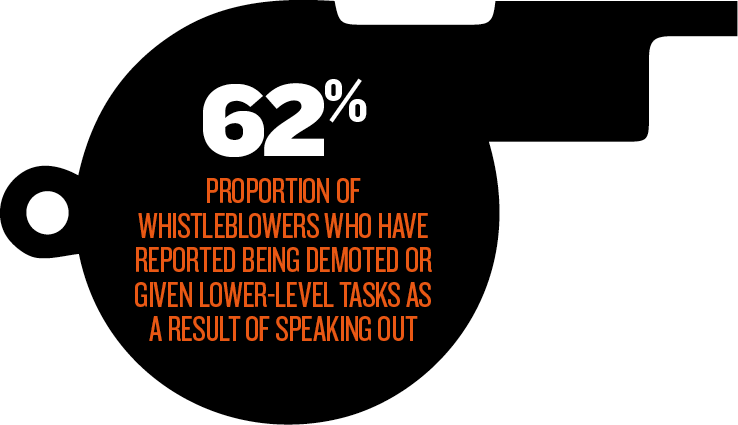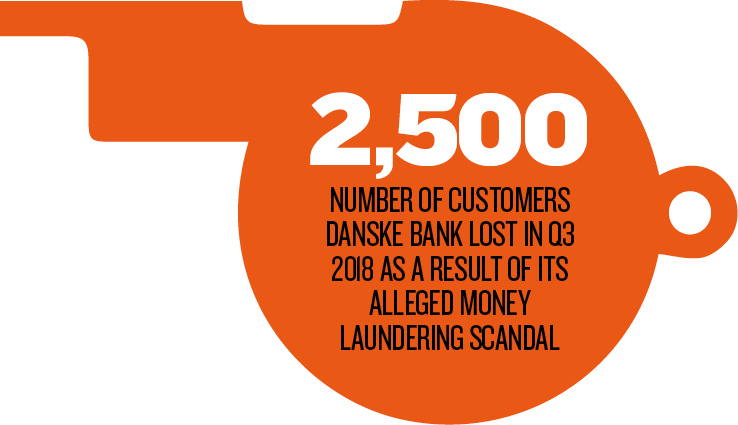
What would you do if you found out the company you worked for was engaging in unethical practices, or was even breaking the law? Many, no doubt, insist they would raise the alarm immediately, informing their managers and, if necessary, law enforcement. But it is easy to claim such a virtuous approach in a hypothetical situation. In reality, blowing the whistle comes with a number of implications and risks.
On multiple occasions – and across a variety of industries – whistleblowers have found that good intentions come with little reward. Regardless of the legal protections sometimes afforded to them, employees who disclose company wrongdoing have been ostracised, demoted or even dismissed.
While some corporations have formal structures in place to encourage the reporting of internal issues, many do not. Without a clear path to disclosing company problems, members of staff have to choose between going public and simply ignoring the issue. Both options can prove disastrous for businesses in the long term. Unfortunately, many companies still view whistleblowers as a nuisance, instead of an asset.
Risky business
On April 23, 2018, the EU drafted a new law designed to strengthen the protections given to whistleblowers across the bloc. The proposed regulation was long overdue: more than 10 years previously, the European Court of Human Rights ruled that the Moldovan Government had violated Article 10 of the European Convention on Human Rights by dismissing a civil servant who revealed information that was in the public interest. It is worrying the EU has only recently attempted to codify whistleblower protections in law.
In the majority of cases, whistleblowers are not looking to get their colleagues fired or discredit their employers: they are simply looking to make things better
The lack of legal certainty has left some whistleblowers in a state of limbo, and has deterred many other employees from speaking out at all. Hervé Falciani, a whistleblower who leaked documents alleging widespread tax evasion at HSBC’s private banking arm, has faced extradition requests from Swiss authorities. Howard Wilkinson, the former Danske Bank manager who alleged the bank was caught up in a €200bn money laundering scheme, called upon national governments to offer him greater protection after his identity was disclosed late last year.
Kyle Welch, an assistant professor at the George Washington University School of Business, has looked extensively at how whistleblowing can affect an organisation. Although his research indicates whistleblowing is a sign of good company health, the landscape for employee disclosure remains risky.
“The protection afforded to whistleblowers varies country by country,” Welch said. “In some countries, protections are starting to move in the other direction and they are starting to have more safeguards for the person being identified in a whistleblowing case rather than the person giving a report.”
Clearly, the safeguards in place to defend whistleblowers against reprisals are not sufficient. Thomas Vink, Whistleblowing Programme Officer at Transparency International, told European CEO that, for the majority of people around the world, speaking up about cases of wrongdoing in the workplace is perilous, and legal protection is lacking: “Most citizens remain largely unprotected if they speak up, facing the risk of retaliation, judicial proceedings and dismissal.
“Around the world, only 34 governments have enacted national whistleblower protection laws. Only 10 EU countries have comprehensive legislation in place – France, Hungary, Ireland, Italy, Lithuania, Malta, the Netherlands, Sweden, Slovakia and the UK – and even in those countries, enforcement is often inadequate. To date, there are no whistleblowing laws that are fully aligned with the 30 Transparency International principles for effective whistleblower protection legislation.”
Fortunately, the EU’s proposed whistleblowing directive should help clarify the legal situation surrounding employee disclosures. If further discussions with the European Commission are successful, then the directive could be adopted before the European parliamentary elections in May. Some of the improved measures it would introduce include allowing whistleblowers to report directly to law enforcement or regulators, as well as allowing for anonymous reporting.
In the vast majority of cases, whistleblowers do not have malicious motives at heart. They are not looking to get their colleagues fired or discredit their employers: they are simply looking to make things better. However, the legal situation in many parts of the world means speaking out remains a big risk.

A problem shared
As a result of inadequate safeguards, employees can be placed in a difficult situation when they discover suspected wrongdoing. Ensuring whistleblowers feel confident about coming forward not only reduces stress for the individual concerned – it boasts advantages for the companies they work at, too.
Last year, Welch – alongside Stephen Stubben, an associate professor at the University of Utah – examined more than 1.2 million anonymised internal reports supplied by NAVEX Global, a leading provider of incident management systems. At first, their findings appeared counterintuitive: the firms that had more problems being reported had better long-term health.
“There is a real problem within management theory today,” Welch said. “There is an idea that it is possible to have the perfect organisation, the perfect manager, the perfect leader and all problems will be solved. But our research shows all firms have problems, and the difference is firms that encourage whistleblowing and internal feedback are the organisations that have fewer issues and concerns going forward.”
In fact, the study found one standard deviation increase in the use of an internal reporting system corresponded with a 6.9 percent decrease in pending lawsuits, and a 20.4 percent fall in aggregate settlement amounts. Welch likened the relationship between a company and prospective whistleblowers to that of a parent and child: “Parents [who] have a relationship where their children feel comfortable sharing their problems are able to deal with them. If those problems aren’t being shared, it doesn’t mean they don’t exist.”
Whistleblowing takes courage, but it can make a huge difference to people’s lives
Of course, this doesn’t mean all incidences of whistleblowing will prove beneficial to a company – especially not in the short term. Following its money laundering scandal, Danske Bank suffered a significant decrease in customer satisfaction, losing 2,500 customers in Q3 2018. Marc Jones, a partner at IBB Solicitors, told European CEO that whistleblowing can be both positive and negative for an organisation – it depends on the nature of the allegation.
“The recent disclosure that aid workers working for Oxfam had sexually exploited victims of the Haiti earthquake in 2010 resulted in a reduction in income of £3.8m [€4.4m] for the charity,” Jones said. “This also changed the public perception of overseas charity workers and damaged the charity sector as a whole. On the other hand, whistleblowing can help an organisation be open, transparent and accountable – to be able to learn from events and prevent future concerns damaging company health.”
Problems at Enron, WorldCom and Lehman Brothers were all raised by whistleblowers – but all were ignored. It is a frustratingly common occurrence: a survey undertaken by Public Concern at Work in 2013 found approximately 60 percent of whistleblowers received no response from their managers after making a claim.
Given some of the high-profile examples of whistleblowers leaking information to journalists or members of the public – and the subsequent reputational damage caused – it’s easy to see why businesses might prefer to sweep their problems under the carpet rather than face them head-on. That is certainly the easier approach. But ignoring a problem means it will surely rear its head again at some point.

Ins and outs
When discussing whistleblowing, it is important to note the distinction between internal and external disclosure. An internal report can allow an organisation to quietly but purposefully address the issue, avoiding unnecessary scrutiny from the media or regulators. There are occasions, however, where internal channels may be inadequate. In these situations, external authorities or even a public debate may be needed to bring about change.
“At Transparency International, we recommend that several types of reporting avenues be available and that the circumstances of each case determine which is the most appropriate channel to use – whether it’s internally, externally to an authority, or to the media/public,” Vink said.
“Whistleblowers should also be able to report directly to the media… or civil society organisations where it is in the public interest, where reporting internally would put them at risk of reprisal, or where external authorities have not taken necessary action. Recent cases, such as LuxLeaks and the Panama Papers, show that not all wrongdoing can be solved behind closed doors.”
Employees must not only weigh up whether an internal or external disclosure will be most effective at dealing with the issue at hand; they must also consider how each approach will affect their own position. Blowing the whistle internally may not be effective and could cause them to be ostracised by their colleagues; an external disclosure, meanwhile, can have greater repercussions for both the organisation and the individual.
“If employees make an internal disclosure and receive negative repercussions, that indicates there is a huge problem at their place of work,” Welch said. “However, if they choose to go external to a regulator immediately, then there’s a significant chance they will damage their reputation with their employer. It’s highly unlikely the firm will look at them in the same way. Going external has a fair amount of risk affiliated with it. It would be nice to see firms encourage internal whistleblowing and then, if they are unresponsive, employees have little choice but to go external.”
Rather than being viewed as an inconvenience, reporting issues at work should be seen as the first step on the road to solving them
The story of the Tuskegee syphilis experiment is a good example of whistleblowing done correctly. In the 1930s, the US Public Health Service conducted a study on the impact of untreated syphilis among African American males. Officials never told those involved about the true nature of the study and continued to withhold treatment even after a cure for syphilis was discovered.
In 1966, Peter Buxtun, a social worker who had only been with the Public Health Service for less than a year, filed an official protest on ethical grounds. After it was rejected, he filed again in 1968. Left with little alternative, Buxtun leaked details of the experiment to The Washington Star in 1972. The study was subsequently terminated, proving that while whistleblowing takes courage, it can make a huge difference to people’s lives.
Changing the tune
In October 2018, Carmen Segarra released an account of how her life had been affected by whistleblowing. In Noncompliant: A Lone Whistleblower Exposes the Giants of Wall Street, Segarra reveals how she faced psychological manipulation and eventual dismissal after looking into conflicts of interest at Goldman Sachs. Her experience is far from unique.
According to a recent study, Post-disclosure Survival Strategies: Transforming Whistleblower Experiences, 62 percent of whistleblowers report having been demoted or given lower-level tasks as a result of speaking out. While many organisations talk of creating an open environment, the reality is often very different.
“Firms have to be dedicated to these whistleblowing systems – there’s lip service and [then] there’s actual dedication,” Welch explained. “If managers are really serious, they will make that clear in company-wide emails, they’ll have posters up in the workplace, and they will promote a culture where whistleblowers feel comfortable they can come forward without being retaliated against. The worst thing is when your employees recognise a big problem at your firm, but instead of trying to fix it, they just decide to get a job somewhere else.”
Even if businesses do not officially penalise whistleblowers, social stigma and informal blackmail may be used to discourage individuals from reporting issues. If organisations want to create an environment where staff feel comfortable raising issues, the first thing they should do is invest in anonymous internal feedback systems. Research indicates such systems do not, as many fear, result in a larger number of external reports, but actually increase the likelihood of potential problems being addressed.
In addition, businesses must create a culture of openness and integrity. Staff training can help to improve the perception of whistleblowing and ensure managers react to reports in the correct way. Further, it’s important employees see action being taken as a result of their disclosures. When it becomes clear whistleblowing has positive results, speaking out becomes a more natural process.

The aftermath
Once an incident has been reported, it would be wrong for businesses to assume this represents the end of the matter. Even if the appropriate action is taken and the whistleblower is vindicated for making his or her report, they may still face challenges. Workplace relationships may have been damaged and internal investigations could have taken their toll on everyone concerned.
“More should be done to offer post-disclosure support to whistleblowers,” Vink said. “Cases like that of Ana Garrido Ramos, the Spanish local government employee whose revelations led to the Gürtel scandal and the fall of Spain’s government in 2018, show that many whistleblowers suffer greatly for choosing to speak out.
“As well as support and protection in the event of retaliation and victimisation, it is also important whistleblowers are able to seek restitution and remedies. Another form of support is to update the whistleblower on how the investigation is going and the next steps.”
Whistleblowers may find their motives questioned – they are also likely to become the victims of retaliation and be resented for placing their head above the parapet. It is important organisations do not allow them to be typecast as ‘snitches’. Mediation and dispute resolution services should be offered to help rebuild trust in the workplace, if necessary.
Offering the right kind of post-disclosure support is another way for companies to alter the perception of whistleblowing. Rather than being viewed as an inconvenience, reporting issues at work should be seen as the first step on the road to solving them. “Human capital is still the most important resource that firms have for identifying and fixing problems,” Welch said. “That is why these incident management systems are designed to pick up the kinds of things you cannot see by reading ones and zeros.”
In the past, whistleblowers have been disregarded and vilified, with businesses happy to maintain the status quo so long as those ones and zeros continue to add up in their favour. This approach has not only caused personal distress to the individuals involved, but has also proved hugely regrettable for businesses in the long term. Ignoring whistleblowers today can lead to huge problems tomorrow.

